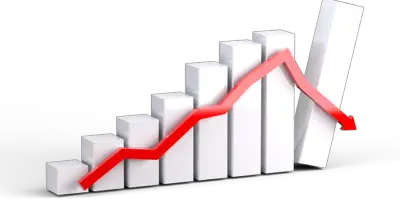What are OTC Markets?

OTC or Over–the–Counter markets refer to the trading of securities directly between two parties without the need for a centralized exchange. In OTC markets, buyers and sellers trade stocks, bonds, and other securities without the formal supervision of an exchange.
OTC markets can include both formal and informal trading platforms, such as electronic bulletin boards, dealer networks, and alternative trading systems. The most common types of securities traded in OTC markets include stocks of small companies, bonds, foreign currencies, and derivatives.
OTC markets are typically less regulated than formal exchanges, and as a result, investors should be aware of the potential risks associated with trading in these markets. OTC securities may be less liquid, meaning that it can be difficult to sell them quickly, and they may also be more susceptible to price manipulation and fraud.
How Do The OTC Markets Work?
OTC markets work differently from formal exchanges, which have a centralized location where buyers and sellers come together to trade securities. In OTC markets, buyers and sellers connect directly with each other, often through a broker-dealer or other intermediaries, to negotiate the terms of their trades.
The process of trading in OTC markets typically involves the following steps:
Finding a counterparty
In OTC markets, buyers and sellers must find each other on their own, often through a broker-dealer or other intermediary.
Negotiating the terms of the trade
Once a buyer and seller have found each other, they negotiate the price, quantity, and other terms of the trade directly with each other.
Executing the trade
Once the terms of the trade have been agreed upon, the buyer and seller execute the trade through their respective brokers or other intermediaries.
Settling the trade
After the trade is executed, the parties must settle the transaction by exchanging the securities and funds involved in the trade. This process can take place directly between the parties or through a clearinghouse or other intermediary.
Brief History of the OTC Markets
The history of OTC markets can be traced back to the early days of stock trading in the United States. In the 19th century, stocks were primarily traded on informal exchanges, where brokers and investors would gather in coffeehouses and other public spaces to buy and sell shares.
As the stock market grew in the early 20th century, formal exchanges such as the New York Stock Exchange (NYSE) and the American Stock Exchange (AMEX) emerged as centralized marketplaces for trading securities. However, OTC trading continued to exist alongside formal exchanges, particularly for smaller or less-established companies that were not listed on the major exchanges.
In the 1970s and 1980s, electronic trading systems began to emerge, enabling buyers and sellers to trade securities more efficiently and transparently. OTC markets also benefited from the deregulation of financial markets during this period, which led to the creation of new financial instruments such as derivatives.
Today, OTC markets have become an important part of the global financial system, with trading volumes in the trillions of dollars. While OTC markets are less regulated than formal exchanges, they are subject to oversight by financial regulators such as the Securities and Exchange Commission (SEC) in the United States and the Financial Conduct Authority (FCA) in the United Kingdom.
Benefits of Trading on the OTC Markets?
OTC markets offer several benefits for investors and companies. Some of the benefits are listed below.
- Access to capital: OTC markets provide a way for smaller or less-established companies to raise capital by issuing securities. These companies may not meet the listing requirements of formal exchanges, but can still access financing through OTC markets.
- Greater flexibility: OTC markets are less formal and more flexible than formal exchanges, which allows for a wider variety of securities to be traded. This can include securities that are not listed on formal exchanges, as well as customized financial instruments such as derivatives.
- Lower trading fees: Trading fees in OTC markets are typically lower than those on formal exchanges, as there is no centralized exchange to take a commission.
- Greater privacy: OTC markets offer greater privacy than formal exchanges, as trades are negotiated directly between buyers and sellers rather than being publicly displayed on an exchange.
- Reduced regulatory burden: Companies listed on formal exchanges are subject to a range of regulations, including reporting requirements and listing fees. OTC markets may offer a less burdensome regulatory environment for companies.
Risk of Trading in the OTC Markets
While OTC markets offer several benefits, there are also significant risks associated with trading in these markets. Some of the key risks include:
- Lower liquidity: OTC securities are often less liquid than securities listed on formal exchanges, which can make it more difficult to buy or sell them quickly.
- Greater volatility: OTC markets can be more volatile than formal exchanges, as there is less regulation and oversight. This can result in larger price swings and greater risk of loss for investors.
- Lack of transparency: OTC markets are less transparent than formal exchanges, as trades are negotiated directly between buyers and sellers rather than being publicly displayed on an exchange. This can make it more difficult for investors to obtain information about the securities they are interested in trading.
- Counterparty risk: Because trades in OTC markets are negotiated directly between buyers and sellers, there is a greater risk of default or other problems with the counterparty. This can result in a loss of funds or securities for investors.
- Potential for fraud: OTC markets can be more susceptible to fraud and manipulation, as there is less regulation and oversight. Investors should be cautious when trading in OTC securities and should do their own research to ensure that they are dealing with reputable counterparties.
How To Buy OTC Stocks?
Buying OTC (over-the-counter) stocks can be different than buying stocks listed on major exchanges like the NYSE or NASDAQ. Here are the general steps to follow when buying OTC stocks:
Research the company
Because OTC stocks tend to be riskier than other stocks, it’s important to do your due diligence before investing. Look into the company’s financials, management team, and business strategy.
Find a broker
Not all brokers allow you to trade OTC stocks, so you’ll need to find one that does. Some popular brokers for OTC trading include TD Ameritrade, E-Trade, and Charles Schwab.
Open a brokerage account
Once you’ve found a broker, you’ll need to open an account. This typically involves filling out an online application and providing personal and financial information.
Fund your account
After your account is approved, you’ll need to fund it with cash before you can start trading.
Place an order
To buy OTC stocks, you’ll need to place an order through your broker. This can be done online or over the phone. Be sure to specify the ticker symbol and the number of shares you want to buy.
Monitor your investment
OTC stocks can be volatile, so it’s important to keep an eye on your investment and be prepared to sell if the stock starts to drop.
Keep in mind that OTC stocks are often less liquid than other stocks, meaning there may not be as many buyers and sellers. This can make it more difficult to buy and sell shares, and it can also lead to wider bid-ask spreads.
Conclusion
Before investing in OTC markets, it’s important to understand the risks and rewards associated with this type of investment. OTC markets are less regulated than traditional stock exchanges, which means that there is a higher risk of fraud and manipulation. However, OTC markets also offer the potential for higher returns, as many companies listed on these markets are in the early stages of growth and have the potential for significant expansion. As with any investment, it’s important to do your research and carefully consider the risks and rewards before making a decision.


